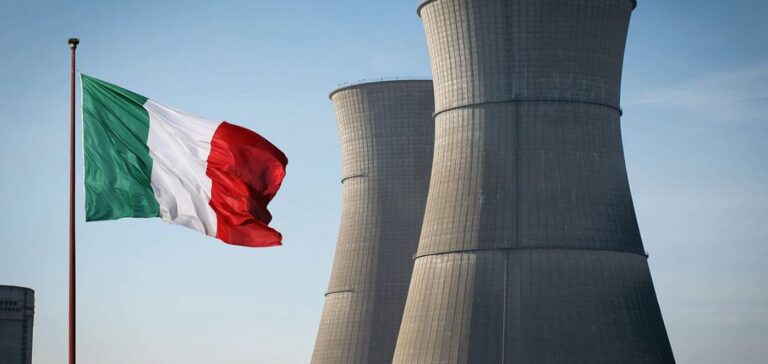The Italian government reintroduced the idea of returning to nuclear energy on Friday, breaking with nearly forty years of popular opposition. According to Energy Minister Gilberto Pichetto Fratin, this re-evaluation aims to strengthen the country’s energy security, support decarbonisation, and reduce electricity costs. He clarified that a legal framework to permit nuclear energy would be developed in the coming year, with the goal of deploying either traditional or next-generation reactors.
The proposal comes amid an energy crisis exacerbated by the war in Ukraine. Nuclear energy could, according to the government, complement renewable energies to ensure supply stability while contributing to the reduction of greenhouse gas emissions. However, experts highlight that the implementation of this project will take at least a decade, due to the technological and financial challenges associated with building new reactors.
The history of nuclear energy in Italy
Italy was a pioneer in nuclear energy, with four reactors in operation until the late 1980s. However, after the Chernobyl disaster in 1986, a popular referendum led to the gradual shutdown of nuclear plants. Another referendum in 2011, following the Fukushima disaster, reaffirmed the rejection of nuclear energy. Currently, the nuclear production sites are being dismantled, and the country still lacks a solution for the storage of radioactive waste.
Political and economic tensions
The proposal to return to nuclear energy is supported by businesses, which hope for a significant reduction in their energy costs. The employers’ organisation Confindustria has called for the reactivation of existing reactors, and discussions are underway to install small modular reactors (SMRs). However, some voices have risen to criticise the high cost of this option. Beatrice Petrovich, an analyst at the think tank Ember, argues that nuclear energy is more expensive and takes longer to deploy than renewable energies like wind or solar.
The increased reliance on uranium, an externally sourced supply, could also pose a geopolitical risk, according to Petrovich. Additionally, opponents argue that such a project could divert attention from faster and cheaper solutions, such as increasing the share of renewable energies in the energy mix.
Future prospects for Italy
Minister Pichetto Fratin mentioned both public and private funding to support this nuclear project, with companies such as Enel, Ansaldo, and Leonardo already involved in the development of SMRs. These smaller, more flexible and quicker-to-install reactors would be seen as a more suitable alternative for the Italian context. However, according to some experts, it is unlikely that Italy will see the actual implementation of nuclear energy for several decades due to political, social, and technical barriers.






















